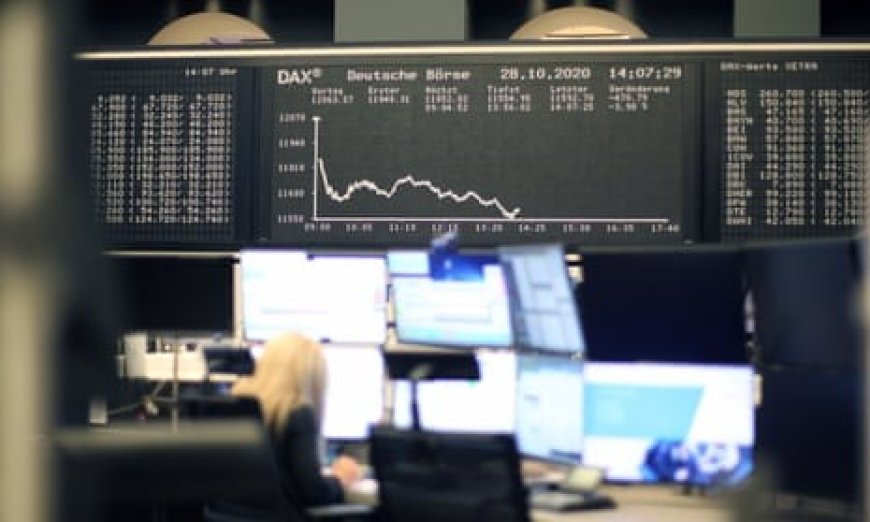Markets in Flux: Dollar Gains Momentum, European Stocks Dip
Explore the latest market trends as European stocks face a prolonged dip and the dollar continues its surge. Get insights into the impact of weak German economic data and Federal Reserve policy projections

European stocks are facing their lengthiest streak of losses in over five years, prompted by lackluster German economic data. Meanwhile, the dollar gains strength as investors place bets on further tightening of Federal Reserve policies. The Stoxx 600 index dipped for the seventh consecutive day, as German industrial output suffered another setback in July, further impeding Europe’s largest economy. The Bloomberg dollar index is on course for an unprecedented eighth week of gains, marking the lengthiest streak in data records dating back to 2005.
Carsten Brzeski, global head of macro for ING Research, commented, “Germany’s industrial production continues to plummet, causing even the most steadfast pessimists to grow apprehensive.” He added, “The comprehensive set of hard macro data for July suggests a heightened risk of recession.”
Pressure mounts on US equity futures as details emerge about China’s plans to restrict the use of iPhones in specific government departments, state-backed agencies, and affiliated companies—a significant blow to Apple Inc.
Treasury yields have risen across most of the curve, extending the uptick from Wednesday that pushed two-year yields above 5%. These movements follow data from the Institute for Supply Management’s US services index, which, in August, reached 54.4—the highest monthly reading since February and surpassing all estimates in a Bloomberg survey of economists. A reading above 50 signifies growth.
Following a series of reports exceeding expectations—spanning consumer spending to residential investment—economists are revising up their forecasts for US gross domestic product. This marks a notable shift from three months ago when the consensus projected a stall in the economy for the current quarter—the last time policymakers updated their figures.
This momentum may be enough to lead Fed officials to reconsider their estimates for rate cuts in 2024. Traders in recent months have scaled back their expectations of the extent of future Fed easing—from well over 150 basis points early in 2023 to around 100 basis points.
Quincy Krosby, chief global strategist at LPL Financial, noted, “The ISM Services Sector report underscores the resilience of the largest portion of the economy.” She also highlighted the indication of higher prices within the data. “This is certainly not good news for a data-dependent Fed.”
A Call for Patience
Fed Bank of Boston President Susan Collins emphasized that policymakers will need to exercise patience as they evaluate economic data to determine their next steps. She suggested that further tightening may still be necessary. Meanwhile, former Fed Bank of St. Louis chief James Bullard remarked that officials should continue to pencil in one additional hike this year when they update their projections later this month.
This risk-averse sentiment extended into Asia, with all major markets experiencing declines. Chinese stocks were among the worst performers, weighed down by property developers, which partially retraced a prior session rally.
The yuan weakened as the People’s Bank of China set the so-called fixing at a stronger-than-expected level for the 54th consecutive day on Thursday. This marks the longest stretch since Bloomberg commenced the daily survey in 2018.
In the commodities sector, oil saw a decline and is poised to conclude a nine-day winning streak—its lengthiest run in over four years. Gold, on the other hand, saw a slight uptick after a drop on Wednesday.
Key events this week include:
-
China forex reserves report on Thursday
-
Eurozone GDP data on Thursday
-
US initial jobless claims on Thursday
-
Bank of Canada Governor Tiff Macklem’s speech on the Economic Progress Report on Thursday
-
Atlanta Fed President Raphael Bostic’s address on Thursday
-
New York Fed President John Williams’ participation in a moderated discussion at the Bloomberg Market Forum on Thursday
-
Japan GDP report on Friday
-
Germany CPI data on Friday
-
US wholesale inventories and consumer credit figures on Friday
Market Movements:
Stocks
-
The Stoxx Europe 600 declined by 0.4% as of 8:12 a.m. London time
-
S&P 500 futures fell by 0.3%
-
Nasdaq 100 futures dropped by 0.5%
-
Futures on the Dow Jones Industrial Average decreased by 0.2%
-
The MSCI Asia Pacific Index saw a 0.7% decline
-
The MSCI Emerging Markets Index also fell by 0.7%
Currencies
-
The Bloomberg Dollar Spot Index saw a 0.1% rise
-
The euro dropped by 0.2% to $1.0710
-
The Japanese yen increased by 0.1% to 147.46 per dollar
-
The offshore yuan decreased by 0.2% to 7.3328 per dollar
-
The British pound fell by 0.3% to $1.2473
Cryptocurrencies
-
Bitcoin saw a 0.3% rise to $25,745.36
-
Ether increased by 0.5% to $1,635.96
Bonds
-
The yield on 10-year Treasuries experienced little change at 4.28%
-
Germany’s 10-year yield remained relatively stable at 2.65%
-
Britain’s 10-year yield declined by two basis points to 4.51%
Commodities
-
Brent crude declined by 0.3% to $90.34 a barrel
-
Spot gold experienced a 0.1% rise to $1,918.51 an ounce."
Also Read:
































































